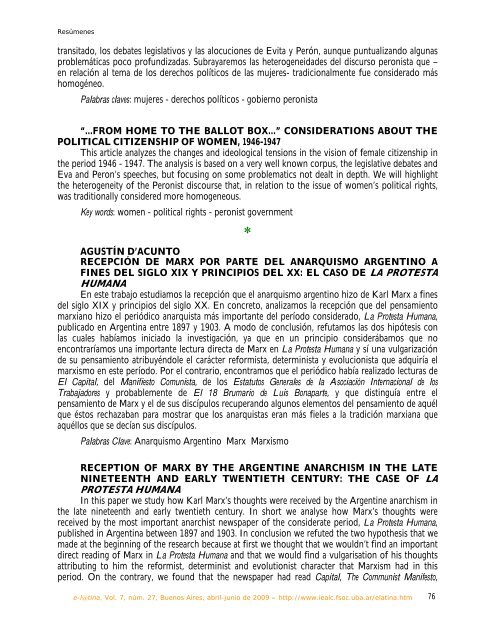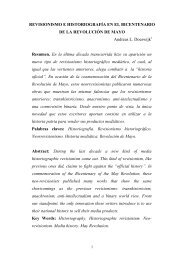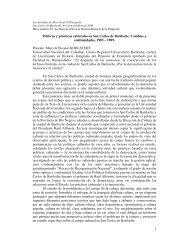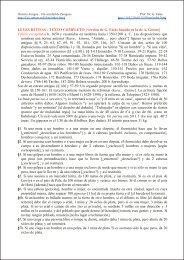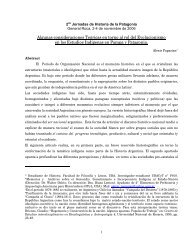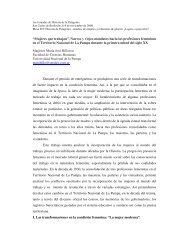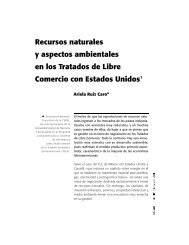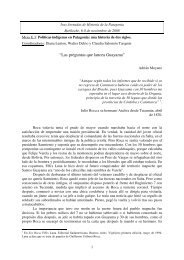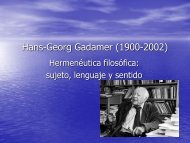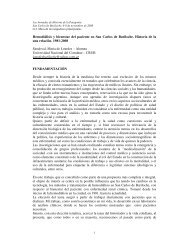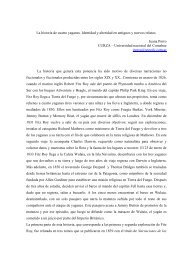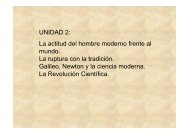Resúmenestransitado, los debates legislativos y las alocuciones de Evita y Perón, aunque puntualizando algunasproblemáticas poco profundizadas. Subrayaremos las heterogeneidades del discurso peronista que –en relación al tema de los derechos políticos de las mujeres- tradicionalmente fue considerado máshomogéneo.Palabras claves: mujeres - derechos políticos - gobierno peronista“...FROM HOME TO THE BALLOT BOX...” CONSIDERATIONS ABOUT THEPOLITICAL CITIZENSHIP OF WOMEN, 1946-1947This article analyzes the changes and ideological tensions in the vision of female citizenship inthe period 1946 - 1947. The analysis is based on a very well known corpus, the legislative debates andEva and Peron’s speeches, but focusing on some problematics not dealt in depth. We will highlightthe heterogeneity of the Peronist discourse that, in relation to the issue of women’s political rights,was traditionally considered more homogeneous.Key words: women - political rights - peronist government∗AGUSTÍN D’ACUNTORECEPCIÓN DE MARX POR PARTE DEL ANARQUISMO ARGENTINO AFINES DEL SIGLO XIX Y PRINCIPIOS DEL XX: EL CASO DE LA PROTESTAHUMANAEn este trabajo estudiamos la recepción que el anarquismo argentino hizo de Karl Marx a finesdel siglo XIX y principios del siglo XX. En concreto, analizamos la recepción que del pensamientomarxiano hizo el periódico anarquista más importante del período considerado, La Protesta Humana,publicado en Argentina entre 1897 y 1903. A modo de conclusión, refutamos las dos hipótesis conlas cuales habíamos iniciado la investigación, ya que en un principio considerábamos que noencontraríamos una importante lectura directa de Marx en La Protesta Humana y sí una vulgarizaciónde su pensamiento atribuyéndole el carácter reformista, determinista y evolucionista que adquiría elmarxismo en este período. Por el contrario, encontramos que el periódico había realizado lecturas deEl Capital, del Manifiesto Comunista, de los Estatutos Generales de la Asociación Internacional de losTrabajadores y probablemente de El 18 Brumario de Luis Bonaparte, y que distinguía entre elpensamiento de Marx y el de sus discípulos recuperando algunos elementos del pensamiento de aquélque éstos rechazaban para mostrar que los anarquistas eran más fieles a la tradición marxiana queaquéllos que se decían sus discípulos.Palabras Clave: Anarquismo Argentino Marx MarxismoRECEPTION OF MARX BY THE ARGENTINE ANARCHISM IN THE LATENINETEENTH AND EARLY TWENTIETH CENTURY: THE CASE OF LAPROTESTA HUMANAIn this paper we study how Karl Marx’s thoughts were received by the Argentine anarchism inthe late nineteenth and early twentieth century. In short we analyse how Marx’s thoughts werereceived by the most important anarchist newspaper of the considerate period, La Protesta Humana,published in Argentina between 1897 and 1903. In conclusion we refuted the two hypothesis that wemade at the beginning of the research because at first we thought that we wouldn’t find an importantdirect reading of Marx in La Protesta Humana and that we would find a vulgarisation of his thoughtsattributing to him the reformist, determinist and evolutionist character that Marxism had in thisperiod. On the contrary, we found that the newspaper had read Capital, The Communist Manifesto,e-<strong>l@tina</strong>, Vol. 7, núm. <strong>27</strong>, Buenos Aires, abril-junio de 2009 – http://www.iealc.fsoc.uba.ar/elatina.htm 76
ResúmenesGeneral Rules of the International Working Men’s Association and probably The Eighteenth Brumaire of LouisBonaparte and that it established differences between Marx’s thoughts and the thoughts of hisdisciples recuperating some elements of the first one that the latter repelled to show that anarchistswere more faithful to Marx’s thoughts than those who considered themselves Marxists.Key Words: Argentine Anarchism - Marx - Marxism∗ÍÑIGO ERREJÓN Y ALFREDO SERRANOBOLIVIA: CONSENSOS SIN ACUERDO.PARA EL MAS, LLEGÓ LA HORA DE LA POLÍTICAEn este artículo se toma la crisis por la aprobación de la Ley de Régimen Electoral Transitorio,en abril del año 2009, como un breve estudio de caso para analizar la correlación de fuerzas en elescenario político boliviano, y los posibles horizontes de futuro.Lejos de ser leídos como avances en la senda de los consensos, los últimos acuerdos y larelativa disminución del conflicto, se argumenta, deben ser entendidos como muestra del“agotamiento discursivo” de ambos polos: el bloque indígena y popular hegemónico, y las élitestradicionales.A su vez, el Movimiento Al Socialismo (MAS), partido en el gobierno, se ve frente al reto dehacer política; ya no en el sentido de interpretar y materializar las demandas populares, sino en el deproponer nuevas consignas de convergencia de los sectores subalternos en un renovado programa decambio.Para terminar, se apuntan algunos de las tareas más urgentes que deben ser acometidas para elavance del proceso.∗BOLIVIA: CONSENSUS WITHOUT AGREEMENTS.FOR THE MAS, IT’S TIME FOR POLITICSIn this paper, the crisis of the Transitional Electoral Regime Law’s passing, in April 2009, istaken as a brief case study to analyze the forces correlation in the Bolivian political arena, so as thepossible future horizons.It is stated that far from being read as progresses in the track of the consensus, the lastagreements and the relative de-escalation of the conflict, have to be understood as an indicator of the“discursive exhaustion” of both poles: the hegemonic indigenous and popular block, and thetraditional elites.Also, the Movement Towards Socialism (MAS), party in the government, is challenged by thenecessity of practicing politics; not anymore in the mere sense of interpreting and implementing thepopular demands, but also in proposing a renovated transformation program for the subalternsectors to merge around.Finally, some of the most urgent tasks for the advance of the political change process arepointed.Key Words: Electoral Law - Crisis of the State - Hegemony.e-<strong>l@tina</strong>, Vol. 7, núm. <strong>27</strong>, Buenos Aires, abril-junio de 2009 – http://www.iealc.fsoc.uba.ar/elatina.htm 77
- Page 1 and 2:
f.mAujob!Revista electrónica de es
- Page 3 and 4:
f.mAujob!Revista electrónica de es
- Page 5 and 6:
f.mAujob/!Revista electrónica de e
- Page 7 and 8:
Juan Francisco Martínez PeriaHait
- Page 10 and 11:
Juan Francisco Martínez PeriaHait
- Page 12 and 13:
Juan Francisco Martínez PeriaHait
- Page 14 and 15:
Juan Francisco Martínez PeriaHait
- Page 16 and 17:
Juan Francisco Martínez PeriaHait
- Page 18 and 19:
Juan Francisco Martínez PeriaHait
- Page 20 and 21:
Juan Francisco Martínez PeriaHait
- Page 22 and 23:
Juan Francisco Martínez PeriaHait
- Page 24 and 25:
BibliografíaAristide, Jean Bertran
- Page 26 and 27:
Aviso a los lectores de f.mAujobLas
- Page 28 and 29: Agustín D’AcuntoRecepción de Ma
- Page 30 and 31: Agustín D’AcuntoRecepción de Ma
- Page 32 and 33: Agustín D’AcuntoRecepción de Ma
- Page 34 and 35: Agustín D’AcuntoRecepción de Ma
- Page 36 and 37: Agustín D’AcuntoRecepción de Ma
- Page 38 and 39: Agustín D’AcuntoRecepción de Ma
- Page 40 and 41: Agustín D’AcuntoRecepción de Ma
- Page 42 and 43: Agustín D’AcuntoRecepción de Ma
- Page 44 and 45: Agustín D’AcuntoRecepción de Ma
- Page 46 and 47: Agustín D’AcuntoRecepción de Ma
- Page 48 and 49: Adriana María Valobra“…Del hog
- Page 50 and 51: Adriana María Valobra“…Del hog
- Page 52 and 53: Adriana María Valobra“…Del hog
- Page 54 and 55: Adriana María Valobra“…Del hog
- Page 56 and 57: Adriana María Valobra“…Del hog
- Page 58 and 59: Adriana María Valobra“…Del hog
- Page 60 and 61: Adriana María Valobra“…Del hog
- Page 62 and 63: Adriana María Valobra“…Del hog
- Page 64 and 65: Adriana María Valobra“…Del hog
- Page 66 and 67: Adriana María Valobra“…Del hog
- Page 68 and 69: AVISOPRESENTACION DE ARTICULOS Y RE
- Page 70 and 71: Iñigo Errejón y Alfredo SerranoBo
- Page 72 and 73: Iñigo Errejón y Alfredo SerranoBo
- Page 74 and 75: Iñigo Errejón y Alfredo SerranoBo
- Page 76 and 77: Estudios SobreHistoria RecienteLa R
- Page 80 and 81: LA REVISTA DE HISTORIAUniversidad N
- Page 82 and 83: RecordatoriosSu campo de estudio e
- Page 84 and 85: Recordatoriosvarios historiadores d
- Page 86 and 87: La Revista de la Pátria Grandehttp
- Page 88 and 89: Congresos, reuniones, jornadasObjet
- Page 90 and 91: Congresos, reuniones, jornadasII CO
- Page 92 and 93: Congresos, reuniones, jornadasEster
- Page 94 and 95: Congresos, reuniones, jornadasMesa
- Page 96 and 97: Congresos, reuniones, jornadasCoord
- Page 98 and 99: Congresos, reuniones, jornadasque i
- Page 100 and 101: Congresos, reuniones, jornadas3. Cu
- Page 102 and 103: IBEROIDEAS:FORO DE DEBATE VIRTUAL D
- Page 104 and 105: Concursos, becas, subsidios5ta CONV
- Page 106 and 107: Concursos, becas, subsidiosIII. Nor
- Page 108 and 109: Concursos, becas, subsidiospago de
- Page 110 and 111: América Latina en los librosPablo
- Page 112 and 113: América Latina en los libros11. Me
- Page 114 and 115: América Latina en los librosGuille
- Page 116 and 117: América Latina en los librosJurand
- Page 118 and 119: América Latina en los librosindust
- Page 120 and 121: América Latina en los librosEl sig
- Page 122 and 123: América Latina en los librosEl tex
- Page 124 and 125: Cuadernos del CLAEHCuadernos del Cl
- Page 126: Buscando América LatinaAmérica La


